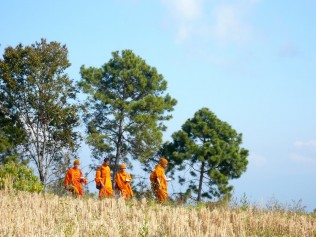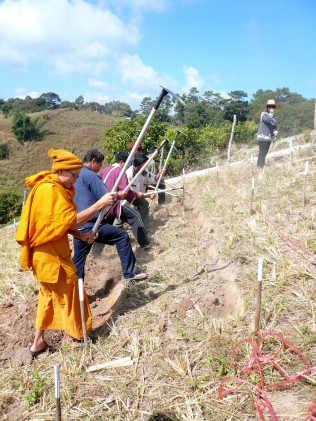Between the months of March and May, air pollution in and around the city of Chiang Mai in northern Thailand reaches hazardous levels as a result of the slash-and-burn agriculture commonly practiced during this season. Now a group of local scientists, farmers and Buddhist monks has launched a new initiative to replace these environmentally damaging traditional practices with more sustainable ways of farming.
The group, known as the Postgraduate Volunteer Monk Campaign for Hilltribe Development (PVMCHD) of the Mahachulalongkorn Buddhist University in Chiang Mai, along with 50 local monks and highland farmers representing 14 hill-tribe villages, gathered in the region in December 2010 to discuss how best to implement sustainable farming practices.

According to a press release issued by the organization, PM10 (particulate matter of less than 10 micrometers in diameter) levels in the air rise three to eight times above the safety standard set by the European Union and the United States during the slash-and-burn season. Hospital emergency rooms and health clinics are overrun with thousands of patients with severe respiratory ailments during the burning season. Tourism dwindles as airports close. There is also significant environmental damage as thousands of hectares of forestland and fields are burned, resulting in soil erosion, landslides and flooding.
Although the air pollution issue has attracted substantial interest from the media, government and other agencies, the problem is getting worse, according to Jonathan Nash, an American expatriate living in Chiang Mai and one of the key players in organizing the recent workshop. “Up to now, “outside’ public and private agencies and environmental groups had totally failed, and the situation was getting worse every year,” Nash told Ethical Traveler via email.

Nash hopes that the PVMCHD group can influence change on a small but long-term scale, which will eventually positively affect air pollution levels as well as help prevent further environmental damage.
In order to encourage farmers to abandon their traditional slash and burn methods, PVMCHD is promoting education, automation and support. For example, the workshop introduced participants to a portable tilling machine, highlighting the feasibility of automated tilling as a viable alternative to harmful slash-and-burn methods.
“I feel that once we make a breakthrough, and this could be as little as two or three willing farmers in each village, we have a reasonable chance to influence a much wider acceptance. Once farmers realize that their land can support all-year cropping and produce much higher yields if they adopt these proven farming methods, they will be willing to abandon their traditional methods which are no longer working,” he said.
Despite the PVMCHD organization’s good intentions, much remains out of its control, as air pollution is a multi-faceted problem with many variables. The Chiang Mai region also suffers the impact of slash-and-burn practices in neighboring countries, as well as forest fires and the burning of trash, shrubs and fossil fuels. The positive effects of the new initiative, if any, won’t be known for years. Still, Nash remains optimistic: “Regardless, it’s a step in the right direction, and in the meantime there is a realistic opportunity to improve the local ecology, reverse a very damaging environmental trend, and significantly improve the lives of indigenous hilltribe highland peoples.”
Further information about the PVMCHD efforts and how to get involved is available from Project Coordinator Dr. Jonathan Nash at jnashdds@gmail.com.
Read Ethical Traveler's Reprint Policy.
